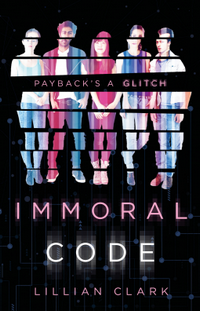 Immoral Code
Immoral Code
eARC, 272 pg.
Alfred A. Knopf Books for Young Readers, 2019
Read: January 22 – 23, 2019

It’s their senior year, their lives are stretching out before them, this incredibly close group of five friends are preparing for graduation, college, etc. — even (not that they’ll confront this quite yet) living without each other. They all excel in one or two ways — one’s a hacker/activist, one’s an artist, one’s got a real shot at the Olympics — etc. One is a physics genius (or close enough to a genius to count) who was admitted early to MIT. But there’s a catch. She can’t afford it. Her mom works two jobs to help the two of them barely make it and her dad hasn’t been in her life since he was a poor student and impregnated her mom. Since then he’s gone on to become one of the richest of the rich. The kind of rich that people really can’t believe exists. So when MIT looks at her financial aid, they roll their eyes and move on to the next student.
Not content to shake their heads sadly at injustice, her friends come up with a plan to hack into her dad’s company and skim a little bit of money. Not enough that he’d ever notice — just enough to pay tuition for a year. Their hacker friend is good, but not good enough to break in remotely — she has to be physically in touch with the network — for just a few seconds. Like the tagline on the cover says, “Payback is a glitch.” So over Spring Break they take a little road trip — bigger than their families know — to get access to the network. It’s going to take a lot of nerve, some real disregard for the law, and their combined talents to pull this off.
The question they don’t really consider until it’s too late isn’t what will happen if they fail (although, they all could think of that more), it’s what happens if they succeed?
On the whole, I haven’t seen many people classifying this as a Crime Novel, despite the Heist story at the core. It’s definitely not a thriller. Because the Heist story is just an excuse to talk about friendship, figuring your life out, the pressure on teens to know what they want the next few decades to be about (not the same as the previous item on the list), the complicated relationship that exists between parents and their teens on the cusp of adulthood, and the hugeness of the moment where you leave home/family/friends to start the next phase of your life. Oh, also, morality. Somehow Clark does all that while telling a fast-moving, funny, and heart-felt story.
Which is not to say that the Heist story isn’t important, or well executed. And you can read the book just for the Heist. But you’ll miss out on a lot — and you’ll probably wonder why I rated this so highly. As fun as the Heist/prep for the Heist is, the heart of the book is the rest.
Each chapter jumps between first-person narration from each kid, keeping things moving nicely. There’s plenty to like/identify with in each character. You learn a lot about them as individuals, them as friends, and generally them as children (not that much about them as students, oddly). They’re so well-drawn, I’m sure what I respond to in one character or another will not be the same as what another reader responds to. There is one character who serves as the group’s Jiminy Cricket — their vocal and ever-present conscience. Like Jiminy, the character is ignored a lot and fought against. But I appreciated them — the voice of moral reason, the one trying to save the others from themselves, the only one who demonstrated a sense of right and wrong, not just about what feels right.
The writing is breezy, engaging — no matter whose POV you’re reading. Clark did a fantastic job differentiating the characters, giving them all a unique voice so that you don’t even have to pay attention to the indicator at the beginning of the chapter to know whose voice is telling that particular chapter. Now, as each chapter is told from the Point of View of a teenager, and fairly realistically done, that means you have to check your inner grammarian at the door — so much of this book can drive you around the bend if you don’t.
The novel is engaging, it’s beyond that really — it’s infectious.There were several points during reading that I asked myself why I was enjoying it as much as I was. Not that I thought I should dislike it, but I liked it a lot more than I should have. I don’t mind that I did, I’m just not sure I understand why. I’m just going to chalk it up to Lillian Clark being a very good author — someone you should check out, starting with her debut, Immoral Code.
Disclaimer: I received this eARC from Random House Children’s Books via NetGalley in exchange for this post — thanks to both for this.
—–



Read Irresponsibly, but please Comment Responsibly